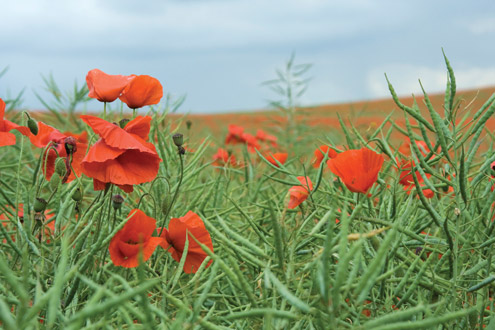Key OSR herbicide set to get broad-leaved boost

Oilseed rape growers have been given a boost ahead of autumn establishment with the launch of a new herbicide that is set to improve post-emergence weed control, particularly in min-till systems.
AstroKerb (aminopyralid + propyzamide), which primarily targets blackgrass, will give growers the added benefit of poppy and mayweed control in oilseed rape. The new product from Dow AgroScience contains the same concentration of propyzamide as the current residual herbicide Kerb Flo 500, which is an essential weapon against blackgrass, but with the addition of the contact aminopyralid.
AICC Yorkshire agronomist Patrick Stephenson is excited by the prospect of a new tool in the armoury and says it could play a big role this coming autumn.
“There has been a big shift to min-till for oilseed rape establishment during the past few years which has placed more emphasis on chemical control of weeds such as this.”
Mr Stephenson believes the new product will fit well into the spray programme of many growers, suggesting that getting the extra control of poppies will prove popular. “It will give us an alternative post-emergence treatment to catch some of the problem weeds.
“I think in time, as we get to know the product, a lot of people will go with some sort of generic metazachlor and follow it up with AstroKerb.
“It won’t suit everybody. For those on heavy clays, cranesbill and cleavers will become more of an issue, but I can see a fairly high use,” he explains.
Dow’s senior marketing specialist John Sellars says although Kerb Flo will still be the leading product, AstroKerb will give growers the opportunity to clear up some of the broad-leaved weeds such as poppies and mayweed and significantly control their blackgrass.
“The main driver will be blackgrass, as propyzamide has no resistance in blackgrass. The aminopyralid will then target those poppies and mayweeds that have become an increasing problem,” he explains.
The timing of application will be the same as propyzamide, when soil temperatures are 10C and falling, and there is sufficient soil moisture of about 80%.
Mr Sellers highlights these conditions generally occur in the first week of November, so this is when growers should be looking to make the application.
“You can use propyzamide or aminopyralid + propyzamide where you are looking to control blackgrass as the main weed. If you have additional weeds such as mayweeds and poppies that have germinated subsequent to a pre-emergence programme or pre-early-post programme, this is where the new herbicide will fit in well,” he says.
In areas where blackgrass pressure is lower, Mr Sellars says growers can reduce the rate.
“By reducing it you won’t necessarily get the best blackgrass control, but it will still have activity against other grassweeds and broad-leaved weeds. So, in areas that are not so much blackgrass driven, possibly in the South West, people may use it.”
However, Mr Sellars says growers should be aware of the main restrictions if they choose to use it. “Unlike Kerb, which you are able to use in beans, AstroKerb is solely used in oilseed rape.”
Stewardship
He also warns that because it contains aminopyralid it has to comply with strict stewardship principles, which are largely applicable to grassland situations.
“So, there are some strange statements on the label, but the main restrictions growers should be aware of is not taking straw off the field.”

